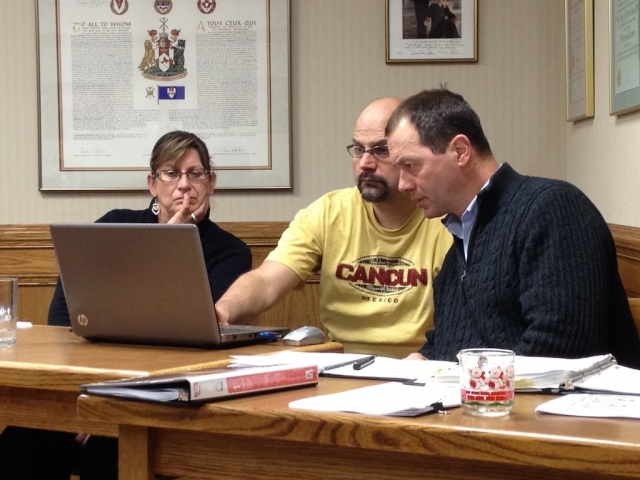Council scraps DCCs and plans for new connection charges
Council will soon debate a series of bylaws to revoke both the Development Cost Charge (DCC) and the regional Sewer Cost Recovery Charge (SCRC), and to replace these with a single Service Capacity Connection Charge (CCC) for water, sewer, and drainage.
Council’s decision to support CCCs over DCCs and SCRCs was unanimous. They argued that CCCs are more equitable across building projects and will encourage more development while still covering the infrastructure costs incurred by new developments. Coun. Tim Thatcher was absent from Monday evening’s committee-of-the-whole, and Coun. Cary Fisher did not participate due to a perceived conflict of interest.
Mayor Greg Granstrom said, “What we’re trying to do here is make sure the developer pays.” He noted, however, that DCCs are “paid up front…before [the developer] puts a shovel in the ground,” and so the early payment acts as a disincentive to develop new properties. “There are other ways,” the mayor said, such as CCCs where “the developer pays into a reserve once they’re using the infrastructure.”
CAO Victor Kumar added, “Cash is coming in when the developer sells, rather than holding anyone hostage to financing.”
Kumar said CCCs are more equitable than DCCs. For example, if someone owns a divided lot and chooses to connect new services, they don’t pay a DCC, whereas the owner of a similar but undivided lot must pay a DCC to divide their lot and get the same service connected. By contrast, “everybody pays connection charge [CCC],” Kumar said.
Currently, for example, both owners would pay the service connection fees of $2200 for water, $1900 for sewer, and $2500 for the SCRC. Only the owner that had to subdivide would pay a DCC of $1791 in town, or $3329 up at Red.
Under the proposed changes, both owners would still pay for water and sewer, but would not pay the SCRC. Both owners would also pay a CCC of $2240, regardless of whether it was in town or at the ski hill.
Coun. Kathy Wallace said she “likes the direction” that the city is going with CCCs over DCCs. “DCCs require consistent rapid growth, which this community did experience for a year, maybe three.”
DCCs are charged to help fund the additional infrastructure burden created when properties are subdivided or multiple-unit dwellings are constructed. They work well when there is a boom in new growth, but Rossland faces a different problem, one of replacing ageing infrastructure for a relatively stable population.
The original DCC bylaw No. 2241 was adopted in December 2004, and was amended with bylaw No. 2315 in February 2006 to increase the DCC fees. No further changes have been made since that time.
In November 2005, Urban Systems produced an updated backgrounder on DCCs that included optimistic projections for Rossland’s development. For example, as 100 subdivision units had been approved in 2005 alone, Urban Systems predicted Red Mountain would soon surpass 1000 new units and trigger a need for substantially new infrastructure.
In May, 2009, AECOM produced another DCC report for the city that predicted “exciting developments … enticing recreational enthusiasts” and strong growth in “seasonal occupants and second home ownership” resulting in “spill over” that, they argued, required DCC rates to be substantially increased to fund infrastructure upgrades.
The AECOM report followed Urban System’s lead in predicting an average of 70 new subdivisions each year over 15 years. These projections made sense in 2009 when, looking back to 2005, there had been an average of 60 subdivisions approved each year, but the economy has changed dramatically. Only 20 new subdivisions have been approved in more than two years since the AECOM report.
For more background on the DCC debate, please see the Rossland Telegraph articles on Sept. 14, 2011 and on Feb. 11, 2012.
By aiming to revise development charges, Wallace said the previous council (2009-2011) was headed in the right direction, “but didn’t get the right tool.” In the DCC debate, council was stymied by the argument that DCCs may deter future development or discourage the construction of reasonably priced housing.
“There are a lot of tools to choose from to get development costs,” Wallace said, and emphasized, “This is not about developers, it’s about development. The cost ultimately gets passed down to the consumer. It’s about affordability.”
Coun. Jill Spearn concurred. “The [CCC] makes good sense in fairness, it’s also reasonable. It lends itself to an affordable, sustainable Rossland. Whatever helps the builder while recovering our costs, I’m in favour of it.”
Coun. Jody Blomme suggested the possibility of eliminating development charges altogether. “Some would argue that when you’re building on infill lots or subdividing, you’re increasing property tax income and, over time, that makes up [for the infrastructure costs to the city].”
Wallace agreed, arguing that “the cost of construction in Rossland is very high relative to Castlegar and Trail.” She said in Castlegar there were “no charges of this type,” and that council, “before we actually put this plan to reading, should look at all the costs to the community.”
They mayor countered, “We’re talking about zero per cent tax increases and reserve funds to replace things. If we were waiting for enough money from taxes [to cover development connections], I don’t think we’d ever catch up. If we don’t put some kind of connection charge, we’d be at a disadvantage.”
Coun. Kathy Moore added, “Castlegar charges a DCC of $4080. And we also had the highest population increase [in the region]. It’s important that we cover our costs. What we’re offered here is a compromise. I like the cleanness [of CCCs], everyone is charged the same.”
Spearn said, “I’m trying to sort out in my mind the fairness, the equitability, of a big subdivision versus something small.” She explained, “A big subdivision is significantly different than some infill lots. Sure there are other tools than DCCs, but I don’t want to lose the city of the negotiation tactic of gaining amenities for the city because of us allowing a big subdivision.”
The mayor said that in a major subdivision, “all the major works are covered by the developer.” Kumar added that negotiations with developers planning large subdivisions can lead to particular contracts to cover any additional infrastructure costs that may be incurred “downstream.”
Spearn clarified her concern about large subdivisions: “It’s more about [the cost to our community from] losing the land base. Your’e losing forest, you’re losing habitat. I want to be assured here that we’re not losing.”
Kumar indicated that the CCCs as drafted in the bylaw would cover the additional infrastructure cost to the city of new connections.
Spearn and Moore also wondered about the implications of repealing the DCC bylaw on projects that have paid these fees over the last eight years. “Do we give the money back?” Spearn asked.
The mayor replied no, but that the use of the DCCs on projects is specifically limited to projects that benefit the development that paid the DCC, and are further limited to either water, sewer, or drainage projects—each DCC fee is split between these three funds at the time it is paid. If council wanted to spend the DCCs on any other purpose, it would require approval from the province.
Typically DCCs should be spent relatively quickly—for example within a decade—on the projects for which they were intended. Instead, the city has amassed a very large DCC reserve tied to very specific projects, many of which are no longer relevant. The SCRC is also meant to be used only for a previously identified project, but to date no project has been contemplated for the SCRC.
Spearn was convinced: “I think [the CCC] is going to be an effective tool that provides equity to the builders in our community, be they large, small, or in between.”
Moore agreed, but was careful to note, “This [CCC bylaw] doesn’t address if we might want to do a different arrangement [for very large developments].”
Moore also advocated that council consult the provincial Inspector of Municipalities before repealing DCCs. She argued that getting the inspector’s “blessing” might help Rossland later on to move the DCC funds to other ends, for example “a new fund for capital projects.” No motion to this effect, however, was made.
























